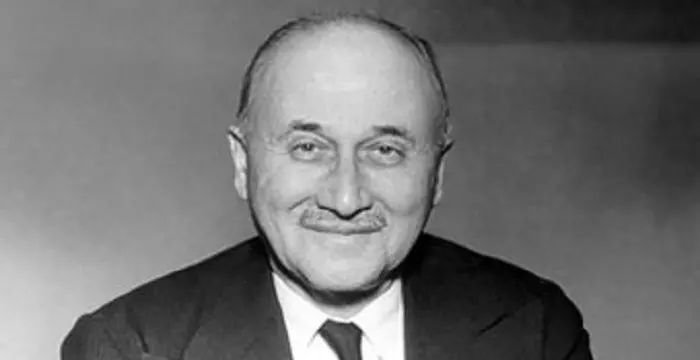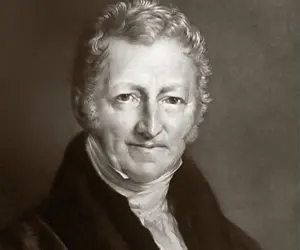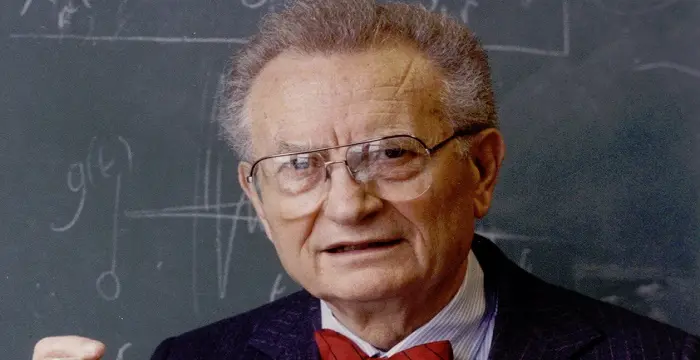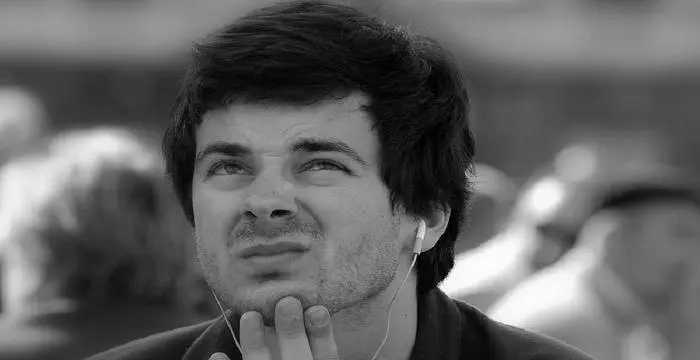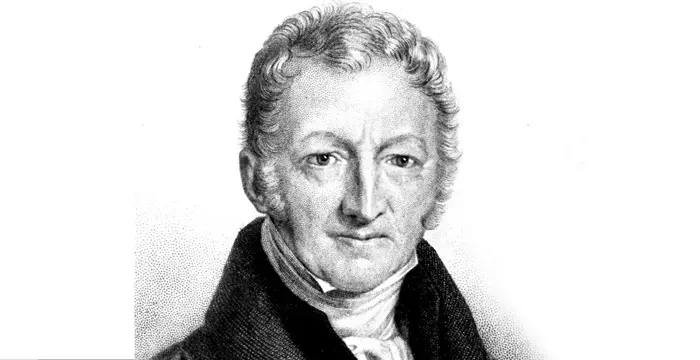
Thomas Robert Malthus - Political Economist, Birthday and Childhood
Thomas Robert Malthus's Personal Details
Thomas Robert Malthus was an English economist best known for his hugely influential theories on population growth
| Information | Detail |
|---|---|
| Birthday | February 13, 1766 |
| Died on | December 23, 1834 |
| Nationality | British |
| Famous | Intellectuals & Academics, Economists, Political Economist |
| Spouses | Harriet |
| Childrens | Emily, Henry, Lucy |
| Universities |
|
| Birth Place | Surrey, England |
| Gender | Male |
| Father | Daniel malthus |
| Mother | Henrietta Malthus |
| Sun Sign | Aquarius |
| Born in | Surrey, England |
| Famous as | Political Economist |
| Died at Age | 68 |
// Famous Political Economist
Jean Monnet
Jean Omer Marie Gabriel Monnet was a French political economist and diplomat who is regarded as the founding father of the European Union. This biography profiles his childhood, life, career, achievements and timeline.
Thomas Robert Malthus's photo
Who is Thomas Robert Malthus?
One of the renowned British clerics and scholars, Reverend Thomas Robert Malthus played an influential role in the field of political economy and demography. He was a Fellow of the Royal Society and is well-known for his theories of population. His most important work, An Essay on the Principles of Population, presented a contradictory theory of evolution and population against what was prevalent in those times. It presented a contrasting view which singled out the fact that the rate at which the population was growing, it would eventually surpass the rate of production of food and would eventually lead to starvation. He was in favour of long-term stability instead of short term practicality. Furthermore, he criticized the Poor Laws, and supported the Corn Laws, which introduced a system of taxes on British imports of wheat. Sadly, he was the most misunderstood and misrepresented economist of all time. His theory, which is known as Malthusian economy, is said to represent a pessimistic outlook of the human population which is doomed to starvation via overpopulation. It was only after the advent of the Keynesian economics that his views and theory became popular in the 20th century. However, till date, he is referred to as the most debated writer and economist of all time.
// Famous Intellectuals & Academics
Bertil Gotthard Ohlin
Bertil Gotthard Ohlin was a famous Swedish economist. This biography profiles his childhood, family life & achievements.
Emily Greene Balch
Emily Greene Balch was an American economist, sociologist and pacifist who won the 1946 Nobel Peace Prize. This biography of Emily Greene Balch provides detailed information about her childhood, life, achievements, works & timeline.
Martin Buber
One of the greatest philosophers to have ever walked on earth, Martin Buber contributions to philosophy is a long-standing one. Explore all about his profile, childhood, life and timeline here.
Childhood & Early Life
Thomas Robert Malthus was the born to Daniel and Henrietta Malthus in Surrey England. He was the seventh child of the couple.
Young Malthus received his preliminary education at home in Bramcote, Nottinghamshire. It was only in 1782 that he enrolled at the Warrington Academy for formal education. However, to his bad luck, the Academy was shut down in 1783.
In 1784, he gained admission at Jesus College, Cambridge. While at the college in Cambridge, he mastered not only English narrative, but Latin and Greek as well.
Graduating from the same, he subsequently enrolled for a Master’s degree, which he eventually attained in 1791. Two years henceforth, he was elected as a Fellow of Jesus College.
In the year 1789, he became a curate at the Oakwood Chapel, in the parish of Wotton, Surrey, abiding by the orders of the Church of England.
Career
In 1798, he released his most well-known work, ‘Essay on the Principle of Population’. The work though not well received then, argued the fact that the increase in the population would eventually lead to a diminished ability of the world to feed itself.
He claimed that if the rate at which population expansion took place steadied at the same pace then it would clearly overtake the rate at which land development for crops are foresighted.
The work stirred a number of arguments as it was much in contrast to the then line of belief. However, with the introduction of the Keynesian economics in the 20th century, his views and arguments began to be seen in the popular light yet again.
Coming under the spotlight, he continued to pen his ideologies and beliefs and between 1798 and 1826 he came up with six editions of ‘An Essay on the Principle of Population’.
Each edition of ‘An Essay on the Principle of Population’ was updated than the previous one and presented an updated account with new line of belief, criticism of the older one and newly found changes in the perspective. It also included pointers for the future improvement of the society at large.
In 1799, he undertook a tour of the European countries along with close friends, Edward Daniel Clarke and John Marten. Throughout the tour, he collected population data.
In 1802, he moved to France and Switzerland during the Peace of Amiens. The following year, he was appointed a rector of Walesby, Lincolnshire.
In 1805, he took the office of the Professor of History and Political Economy at the East India Company College in Hertfordshire, thus becoming the first ever to hold the academic office. It was there that he earned the nickname, ‘Pop’ or ‘Population’ Malthus due to his works.
In 1818, he was made a Fellow of the Royal Society. During the beginning of the 1820s decade, he was a part of the discussion forum ‘Malthus-Ricardo debate’ wherein both of them presented their views and proponents of the political economy. They even discussed about the nature and value of rent
In 1821, he was the founding member of the Political Economy Club. Three years later, he was elected as one of the ten royal associates of the Royal Society of Literature.
In 1834, he was chosen as one of the first fellows of the Statistical Society that was founded the same year.
Personal Life & Legacy
In 1804, he got married to Harriet, daughter of John Eckersall of Claverton House, St. Catherine's, near Bath, Somerset. The couple was blessed with two children, a son and daughter.
His son, Henry rose to the rank of a Vicar of Effingham, Surrey, in 1835, and of Donnington, West Sussex, in 1837.
He died an untimely death on December 23, 1834 at his father-in-law’s house. He was interred at Bath Abbey
Trivia
This English economist is best known for his hugely influential theories on population growth.
// Famous Economists
Bertil Gotthard Ohlin
Bertil Gotthard Ohlin was a famous Swedish economist. This biography profiles his childhood, family life & achievements.
Emily Greene Balch
Emily Greene Balch was an American economist, sociologist and pacifist who won the 1946 Nobel Peace Prize. This biography of Emily Greene Balch provides detailed information about her childhood, life, achievements, works & timeline.
Paul Samuelson
Nobel laureate Paul Anthony Samuelson is referred to as the ‘Father of Modern Economics’. This biography profiles his childhood, life, career, achievements and interesting facts about him.
Thomas Robert Malthus biography timelines
- // 13th Feb 1766Thomas Robert Malthus was the born to Daniel and Henrietta Malthus in Surrey England. He was the seventh child of the couple.
- // 1782 To 1783Young Malthus received his preliminary education at home in Bramcote, Nottinghamshire. It was only in 1782 that he enrolled at the Warrington Academy for formal education. However, to his bad luck, the Academy was shut down in 1783.
- // 1784In 1784, he gained admission at Jesus College, Cambridge. While at the college in Cambridge, he mastered not only English narrative, but Latin and Greek as well.
- // 1789In the year 1789, he became a curate at the Oakwood Chapel, in the parish of Wotton, Surrey, abiding by the orders of the Church of England.
- // 1791Graduating from the same, he subsequently enrolled for a Master’s degree, which he eventually attained in 1791. Two years henceforth, he was elected as a Fellow of Jesus College.
- // 1798In 1798, he released his most well-known work, ‘Essay on the Principle of Population’. The work though not well received then, argued the fact that the increase in the population would eventually lead to a diminished ability of the world to feed itself.
- // 1798 To 1826Coming under the spotlight, he continued to pen his ideologies and beliefs and between 1798 and 1826 he came up with six editions of ‘An Essay on the Principle of Population’.
- // 1799In 1799, he undertook a tour of the European countries along with close friends, Edward Daniel Clarke and John Marten. Throughout the tour, he collected population data.
- // 1802In 1802, he moved to France and Switzerland during the Peace of Amiens. The following year, he was appointed a rector of Walesby, Lincolnshire.
- // 1804In 1804, he got married to Harriet, daughter of John Eckersall of Claverton House, St. Catherine's, near Bath, Somerset. The couple was blessed with two children, a son and daughter.
- // 1805In 1805, he took the office of the Professor of History and Political Economy at the East India Company College in Hertfordshire, thus becoming the first ever to hold the academic office. It was there that he earned the nickname, ‘Pop’ or ‘Population’ Malthus due to his works.
- // 1818In 1818, he was made a Fellow of the Royal Society. During the beginning of the 1820s decade, he was a part of the discussion forum ‘Malthus-Ricardo debate’ wherein both of them presented their views and proponents of the political economy. They even discussed about the nature and value of rent
- // 1821In 1821, he was the founding member of the Political Economy Club. Three years later, he was elected as one of the ten royal associates of the Royal Society of Literature.
- // 1834In 1834, he was chosen as one of the first fellows of the Statistical Society that was founded the same year.
- // 23rd Dec 1834He died an untimely death on December 23, 1834 at his father-in-law’s house. He was interred at Bath Abbey
- // 1835 To 1837His son, Henry rose to the rank of a Vicar of Effingham, Surrey, in 1835, and of Donnington, West Sussex, in 1837.
// Famous British peoples
Wentworth Miller
Wentworth Miller is an American actor and screenwriter who achieved recognition for his role in the TV series ‘Prison Break’.
Sophie Reade
Sophie Victoria Reade is a British model and reality show star. Let’s take a look at her family and personal life, including her age, birthday, boyfriends, and some interesting facts.
Josh Temple
Check out all that you wanted to know about Josh Temple (Slogoman), the famous British YouTube Personality; his birthday, his family and personal life, his girlfriends, fun trivia facts and more.
Yammy Xox
Check out all that you wanted to know about Yammy Xox, the famous British YouTube Personality; her birthday, her family and personal life, her boyfriends, fun trivia facts and more.
Grian
Grian is an English YouTube gamer and social media influencer. Check out this biography to know about his birthday, childhood, family life, achievements and fun facts about him.
Benjamin Atkinson
Benjamin Atkinson is the son of the world-renowned British actor and comedian, Rowan Atkinson. Check out this biography to know about his childhood, family, personal life, including his age, birthday, etc.
Thomas Robert Malthus's FAQ
What is Thomas Robert Malthus birthday?
Thomas Robert Malthus was born at 1766-02-13
When was Thomas Robert Malthus died?
Thomas Robert Malthus was died at 1834-12-23
Where was Thomas Robert Malthus died?
Thomas Robert Malthus was died in Bath, England
Which age was Thomas Robert Malthus died?
Thomas Robert Malthus was died at age 68
Where is Thomas Robert Malthus's birth place?
Thomas Robert Malthus was born in Surrey, England
What is Thomas Robert Malthus nationalities?
Thomas Robert Malthus's nationalities is British
Who is Thomas Robert Malthus spouses?
Thomas Robert Malthus's spouses is Harriet
Who is Thomas Robert Malthus childrens?
Thomas Robert Malthus's childrens is Emily, Henry, Lucy
What was Thomas Robert Malthus universities?
Thomas Robert Malthus studied at Jesus College, Cambridge, University of Cambridge
Who is Thomas Robert Malthus's father?
Thomas Robert Malthus's father is Daniel malthus
Who is Thomas Robert Malthus's mother?
Thomas Robert Malthus's mother is Henrietta Malthus
What is Thomas Robert Malthus's sun sign?
Thomas Robert Malthus is Aquarius
How famous is Thomas Robert Malthus?
Thomas Robert Malthus is famouse as Political Economist
